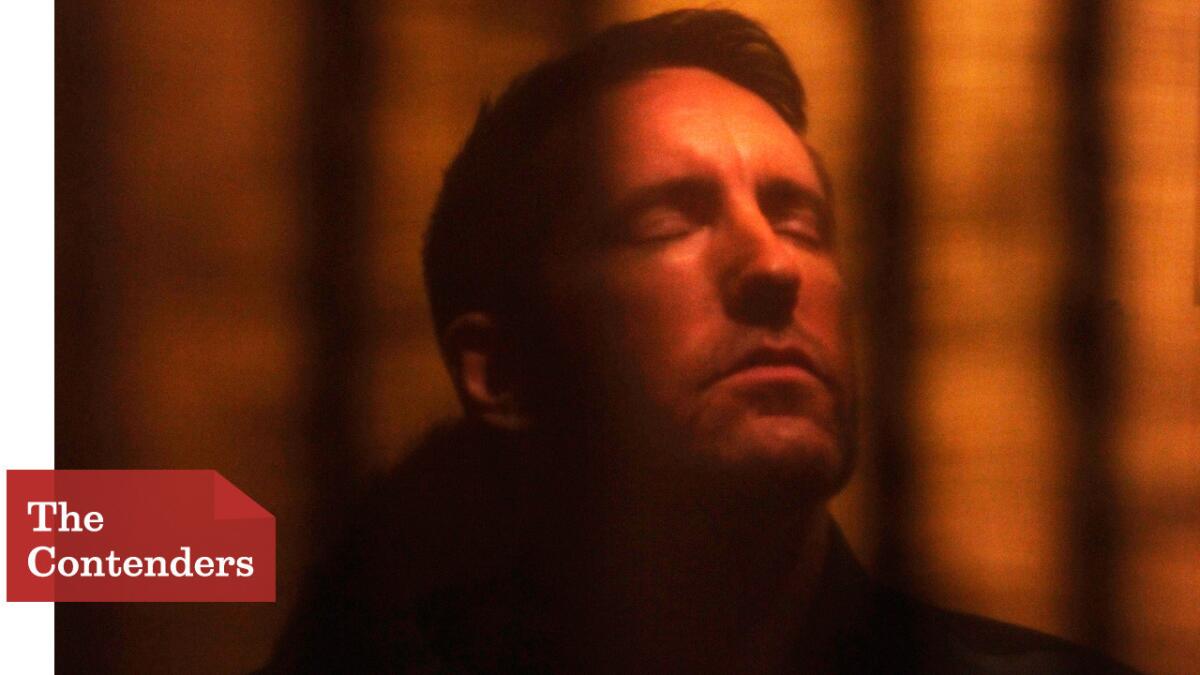The Envelope: Trent Reznor says spare ‘Gone Girl’ score was crafted to evoke dread

- Share via
Gillian Flynn’s thriller “Gone Girl” rose to the top of the bestseller charts on the strength of its page-turning depiction of an ideal suburban marriage turned bad.
For his big-screen adaptation, starring Rosamund Pike and Ben Affleck as embattled couple Amy and Nick Dunne, director David Fincher wanted to retain the palpable dread and extreme tension animating Flynn’s prose, an approach that extended to the spare, haunting score.
“He was looking for something that could deliver that sense of a façade,” said Oscar-winning composer Trent Reznor. “It’s meant to feel almost in a saccharine way, comforting, everything’s great. Peel a layer off or listen a little closer and things may not be as they appear. There’s some turbulence and decay under the surface — that we know how to do.”
Reznor and his longtime collaborator Atticus Ross have extensive experience channeling their darker impulses into the music they make with Nine Inch Nails, but they also have found critical success and creative renewal scoring Fincher’s films — they won an Academy Award for their first partnership, 2010’s “The Social Network.”
On a mid-November morning, Reznor, 49, discussed his professional rapport with the notoriously exacting filmmaker and his approach to writing music for the big screen.
What sorts of initial conversations did you have with David Fincher about the music for “Gone Girl”?
What’s fun about working with him or, I guess in film in general, is I’m not the boss. I’m in a service position where I’m trying to contribute to someone else’s vision and hopefully infuse it with my own idea. We become familiar with the material and we listen a lot. He may not know exactly what it sounds like but he knows the role he wants the music to play.... Here, the focus [was] on how can we make someone feel at ease or pleasant or comforted in a way that feels like doctor’s office wallpaper, an insincere sense of calmness.
You and Atticus wrote the bulk of the score during the most recent Nine Inch Nails tour. Had that been planned?
We had been working on a Nine Inch Nails record, started to talk about how that inevitably meant some sort of tour, had everything lined up with Fincher about his plans, which at the time were for a different film that was going to start this past fall. Had the tour booked, then got the call, “Hey, it’s not happening, the film, but I am going to do ‘Gone Girl’ and that’s going to move the schedule ahead to land exactly when your tour’s booked.” OK, so do I cancel the tour? Or do I give the film up to someone else?
I just had to figure out some way to try to make it work, which led to great anxiety but I think might have led to a better result because it made us work — this is me justifying now — but we worked in kind of concentrated chunks in between. We’d be in Europe for four weeks and home for two weeks, “OK, let’s do a chunk and then nothing for six weeks. Then let’s do a week and a half.”
It led to very focused, intense sessions of writing with time away.
How did that differ from scoring “The Social Network” and “Dragon Tattoo”?
Our normal method is just to go and go for months and months and months until it’s done and try to figure out what we did and see if it’s any good. Before we start composing, we try to define what we think it is in hopes that it has its own identity and its own kind of feel. What benefits Atticus and me, we still don’t have a kind of method together, it’s not an assembly line by any means, it’s still very mom and pop. How are we going to figure this out? We don’t have a team. It’s just us in a room.
Do you experience the music differently hearing it in the finished film?
It puts it in a totally different experience. The first time I saw it with people was at the New York Film Festival. It didn’t sound that good in the theater, and either I had a fever or it was 110 degrees in there. I’m in a suit trying to not be covered in sweat, but you realized, “Wow, people are laughing in certain spots.”
We went and saw it again at ArcLight here in town.... It ends in a kind of weird place if you’re not intimately familiar with the story. Rather than it kick into, here’s some up-tempo music, it ends on an uncomfortable, bowel-churning sound that goes on endlessly. I just got goose bumps thinking about it. Film ends, everyone gets up, they’re not sure what to say. And that’s exactly what we were hoping would happen. Not to make it unpleasant but you leave the theater going, “Whoa,” instead of “Ah, it was just a dream.”
More to Read
Only good movies
Get the Indie Focus newsletter, Mark Olsen's weekly guide to the world of cinema.
You may occasionally receive promotional content from the Los Angeles Times.











